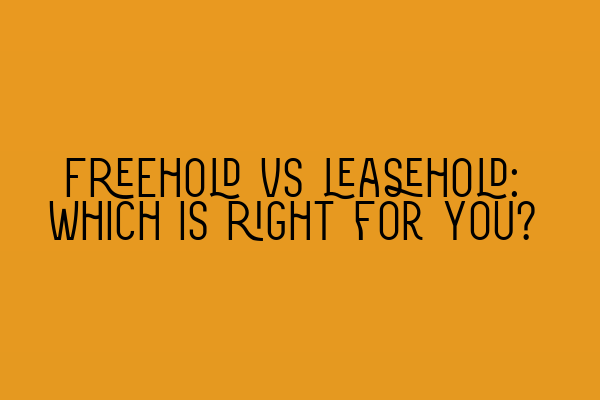Freehold vs Leasehold: Which is Right for You?
When it comes to purchasing a property, one of the most important decisions you need to make is whether to opt for freehold or leasehold ownership. Understanding the differences between the two and how they may impact you is crucial in making an informed choice. In this blog post, we will delve into the key aspects of freehold and leasehold properties, and discuss which option may be right for you.
First, let’s start with the basics. Freehold ownership grants you complete ownership of the property and the land it stands on. With a freehold property, you have the freedom to make alterations or changes to the property without seeking permission from anyone else. This type of ownership is often preferred by individuals seeking a sense of complete control and autonomy over their property.
On the other hand, leasehold ownership means that you own the property for a specific period of time, typically referred to as the lease term. When you purchase a leasehold property, you enter into a contractual agreement with the freeholder or landlord, who owns the land. The lease agreement outlines the rights and responsibilities of both parties. It is important to note that the leasehold ownership comes with certain restrictions and obligations, such as seeking the freeholder’s consent for alterations, paying ground rent, service charges, and adhering to any specific terms laid out in the lease.
Now that we have a basic understanding of the two types of ownership, let’s dive deeper into the advantages and disadvantages of each.
Advantages of Freehold Ownership:
1. Complete Ownership: As a freeholder, you have full control over your property and the land it occupies. You can modify or enhance your property without seeking permission.
2. No Ground Rent or Service Charges: Unlike leasehold properties, freehold properties do not typically require the payment of ground rent or service charges to the freeholder.
3. Equity and Value: Freehold properties often come with higher market value and are generally more attractive to buyers, making them a good long-term investment.
Disadvantages of Freehold Ownership:
1. Maintenance Responsibility: As a freeholder, you are solely responsible for the maintenance and repairs of the property, including any associated costs.
2. Cost Considerations: Freehold properties may be more expensive upfront, making it harder to enter the property market for some individuals.
Advantages of Leasehold Ownership:
1. Affordability: Leasehold properties often have a lower upfront cost compared to freehold properties, making them more affordable for first-time buyers.
2. Shared Maintenance Responsibility: In a leasehold property, the overall maintenance and repairs of the building and communal areas are usually shared among multiple leaseholders, lightening the individual burden.
3. Access to Amenities: Leasehold properties, particularly in apartment complexes or gated communities, may provide access to communal amenities such as gyms, swimming pools, or gardens.
Disadvantages of Leasehold Ownership:
1. Lease Terms and Extension: Leasehold properties come with a specific lease term, and once the lease term expires, the ownership reverts to the freeholder. It is essential to consider the remaining lease term before purchasing a leasehold property. Extending the lease term can also incur additional costs.
2. Ground Rent and Service Charges: Leasehold properties often require payment of ground rent and service charges to the freeholder, adding to the overall cost of ownership.
3. Restrictive Covenants: The lease agreement may include certain restrictions, such as limitations on pet ownership or restrictions on property alterations, which can curtail your freedom as a homeowner.
Now that we have examined the pros and cons of freehold and leasehold ownership, which option is right for you depends on your individual circumstances and preferences. If you value absolute control over your property and are willing to bear the responsibility of maintenance and repairs, freehold ownership may be the better choice. On the other hand, if affordability and shared maintenance responsibilities are more appealing to you, leasehold ownership may be a suitable option.
It is crucial to seek professional advice from a property law solicitor before making any decisions. They can guide you through the complexities of property ownership, review lease agreements, and assist in making an informed choice based on your unique situation.
Remember, making the right choice between freehold and leasehold ownership is an important step towards ensuring a satisfactory property purchase experience. Take the time to assess your priorities, consider the advantages and disadvantages, and consult with experts to make an informed decision that aligns with your needs and goals.
For more information and resources on property law and the SQE exams, be sure to check out the following articles:
– SQE 1 Practice Exam Questions
– SQE 1 Practice Mocks FLK1 FLK2
– SQE 2 Preparation Courses
– SQE 1 Preparation Courses
– SRA SQE Exam Dates
Make an informed decision and embark on your property ownership journey with confidence.
